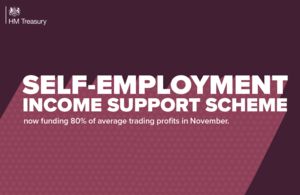
Here is the latest from the UK Government on the increased support for the UK’s Self-Employment Income Support Scheme under this week’s anticipated National Lockdown measures:
- Government increases support under the third instalment of the UK-wide Self-Employment Income Support Scheme, with people receiving 80% of average trading profits for November
- Grants will also be paid faster than previously planned – with the claims window opening at the end of November rather than the middle of December
- The increase means £4.5 billion of support for the self-employed between November and January
- More businesses will also be able to benefit from government loan schemes, which have been extended to the end of January, while firms can ‘top-up’ existing Bounce Back Loans should they need additional finance
While the recent changes to the furlough scheme, the UK-wide Self-Employment Income Support Scheme (SEISS), will be made “more generous” – with self-employed individuals receiving 80% of their average trading profits for November. However, millions of self-employed that have not been eligible from the beginning of the SEISS scheme could be in a precarious position, with some expecting to lose their homes.
ExcludedUK is already reporting on some self-employed people turning to suicidal thoughts, which is the greatest loss imaginable. Former Army veterans are also being turned away support.
Payments under SEISS will also be made more quickly with the claims window being brought forward from 14 December to 30 November.
The changes will ensure that eligible self-employed individuals who temporarily cannot carry out their business or have suffered reduced demand due to the outbreak are supported over winter.
In addition, more businesses will be able to access additional support as deadlines for applications for government-backed loan schemes and the Future Fund have been further extended until 31 January 2021.
Chancellor of the Exchequer Rishi Sunak said:
So far we’ve provided £13.7 billion of support to self-employed people through the crisis – and I’ve always said we will continue to do everything we can to support livelihoods across the UK.
The rapidly changing health picture has meant we have had to act in order to protect people’s lives and I know this is incredibly worrying time for the self-employed. That is why we have increased the generosity of the third grant, ensuring those who cannot trade or are facing decreased demand are able to get through the months ahead.
Business Secretary Alok Sharma said:
We know what an incredibly difficult time it has been for self-employed workers across the country. We are determined to support them.
Today’s measures will mean people will receive more money in their back pockets, faster, to help them through the winter months ahead.
As SEISS grants are calculated over three months, the uplift for November to 80 per cent, along with the 40 per cent level of trading profits for December and January, increases the total level of the third grant to 55 per cent of trading profits. The maximum grant will increase to £5,160.
“This provides broadly equivalent support to the self-employed as we are providing to employees through the government contribution in the Coronavirus Job Retention Scheme in November and then the Job Support Scheme in the two subsequent months,” said an official government statement.
So far, the government has provided £13.7 billion of support to self-employed people through the crisis.
In September, the Chancellor announced an extension of the SEISS to provide support throughout the Winter period, with two grants to cover the period until April.
Government backed loan schemes have already supported more than 1 million businesses to access over £60 billion of finance, however, will those ‘Excluded’ have to foot the bill regardless?
Further information
- To be eligible for the Grant Extension self-employed individuals, including members of partnerships, must:
- Have been previously eligible for the Self-Employment Income Support Scheme first and second grant (although they do not have to have claimed the previous grants)
- Declare that they intend to continue to trade and either:
- Are currently actively trading but are impacted by reduced demand due to coronavirus
- Were previously trading but are temporarily unable to do so due to coronavirus
- This follows the CJRS being extended until December. This provides broadly equivalent support to the self-employed as is being provided to employees through the government contribution in the Coronavirus Job Retention Scheme in November and then the Job Support Scheme in the two subsequent months.



